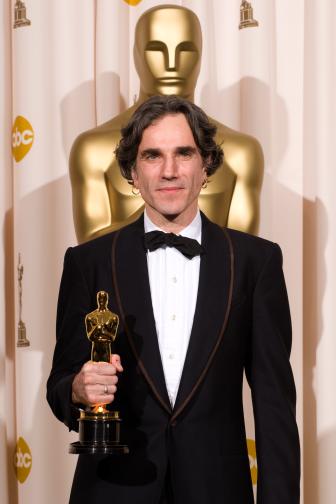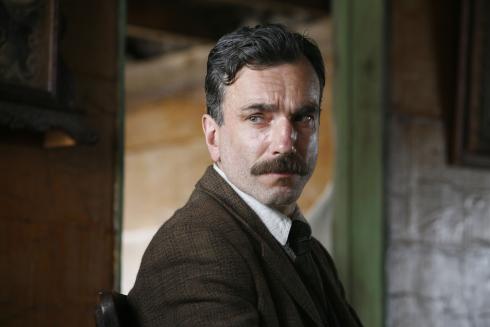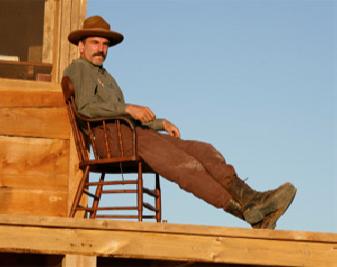- MENU
- HOME
- SEARCH
- WORLD
- MAIN
- AFRICA
- ASIA
- BALKANS
- EUROPE
- LATIN AMERICA
- MIDDLE EAST
- United Kingdom
- United States
- Argentina
- Australia
- Austria
- Benelux
- Brazil
- Canada
- China
- France
- Germany
- Greece
- Hungary
- India
- Indonesia
- Ireland
- Israel
- Italy
- Japan
- Korea
- Mexico
- New Zealand
- Pakistan
- Philippines
- Poland
- Russia
- South Africa
- Spain
- Taiwan
- Turkey
- USA
- BUSINESS
- WEALTH
- STOCKS
- TECH
- HEALTH
- LIFESTYLE
- ENTERTAINMENT
- SPORTS
- RSS
- iHaveNet.com: Oscars 2009

This is Daniel Day-Lewis' 4th Academy Award Oscar nomination in the Best Actor category and second Oscar for Best Actor
Daniel Day-Lewis also won an Academy Award Oscar for his performance in My Left Foot (1989) and was nominated for In the Name of the Father (1993) and Gangs of New York (2002).
When Daniel Day-Lewis came on board to take the role, Daniel Plainview immediately took on even deeper human contours, in a breathtaking pendulum ranging from dark humour to terrifying insanity, from moments of surprising tenderness to outbursts of dastardly menace.
A sprawling epic about family, faith, power and oil, THERE WILL BE BLOOD is set on the radical frontier of California's turn-of-the-century petroleum boom. The story chronicles the rise of one Daniel Plainview (Daniel Day-Lewis), who transforms himself from a down-and-out silver miner raising a son on his own into a self-made oil tycoon.
When Plainview gets a mysterious tip that there's a little town out West where an ocean of oil is oozing out of the ground, he heads with his son, HW (Dillon Freasier), to take their chances in dust-worn Little Boston. In this hardscrabble town, where the main excitement centres around the holy-roller church of charismatic preacher Eli Sunday (Paul Dano), Plainview and HW make their lucky strike.
But even as the well raises all of their fortunes, nothing will remain the same as conflicts escalate and every human value - love, hope, community, belief, ambition and even the bond between father and son - is imperilled by corruption, deception and the flow of oil.
About Daniel Day-Lewis
From his earliest roles, Daniel Day-Lewis impressed audiences and critics alike, moving easily from a punk rocker in MY BEAUTIFUL LAUNDERETTE to a delightfully foppish Victorian suitor in Merchant-Ivory's A ROOM WITH A VIEW. Together these performances earned him 1986's New York Film Critics Circle Award as Best Supporting Actor, the first of a string of accolades, including an Academy Award® for Best Actor, three Academy Award® nominations, two BAFTA awards for Best Actor, four BAFTA nominations and four Golden Globe nominations. Day-Lewis also won the Screen Actors Guild Award twice, the New York Critics Award three times and the LA Critics Award.
Though Day-Lewis has continued to turn in one highly-praised performance after another, it was his role as writer, artist and cerebral palsy sufferer Christy Brown in MY LEFT FOOT for director Jim Sheridan, which won him an Academy Award® for Best Actor. He received his second Academy Award® nomination for IN THE NAME OF THE FATHER, his second collaboration with Sheridan - the true story of a man unjustly imprisoned for 15 years - and his third for his portrayal of Bill, The Butcher in Martin Scorsese’s GANGS OF NEW YORK. His other wide-ranging roles include the early American adventurer Hawkeye in THE LAST OF THE MOHICANS, and the aristocratic Newland Archer in his first collaboration with Martin Scorsese, THE AGE OF INNOCENCE.
Born in London (but now an Irish citizen), Day-Lewis was first introduced to acting when he was at school in Kent, England. His acting debut was in CRY, THE BELOVED COUNTRY and his film debut was at the age of 14 in SUNDAY BLOODY SUNDAY, in which he played a vandal in an uncredited role. He later applied and was accepted to the renowned Bristol Old Vic Theatre School, which he attended for three years, eventually performing at the Bristol Old Vic itself. In the 1970s and early 1980s, he worked on stage, appearing with the Bristol Old Vic Theater Company, the Royal Shakespeare Company and the Royal National Theater, turning in notable performances in Another Country, Dracula, Futurists and Hamlet, in which he played the title role.
Day-Lewis's additional film credits include Philip Kaufman's film version of THE UNBEARABLE LIGHTNESS OF BEING, in which he won praise for his memorable performance in the leading role, and the Arthur Miller classic THE CRUCIBLE, in which he portrayed Puritan John Proctor opposite Winona Ryder, directed by Nicholas Hytner. He joined up with Jim Sheridan once again for the lead role in THE BOXER, and most recently Day-Lewis was seen in Rebecca Miller’s powerful and poetic THE BALLAD OF JACK AND ROSE.

About the Movie "There Will Be Blood"
THERE WILL BE BLOOD began with Upton Sinclair's 1927 novel Oil!, although the tale took off in its own cinematic direction from there. While in a London bookshop, a homesick Anderson spied the novel and its California-themed cover instantly drew him. Once he began reading, he was compelled by Sinclair's view of the state in a time when tenacious, risk-taking oil prospectors were changing the then-rural landscape with derricks and oil fields. "The novel is set in an area, Signal Hill, I know well and that part of California's history has always been interesting to me," says Anderson. "Reading the novel was quite exciting."
Upton Sinclair, of course, is best known for his still widely read 1907 novel, The Jungle, a triumph of muckraking fervour set in the slaughterhouses of Chicago that forever changed the American food industry. Two decades later, he would write an epic intended to similarly probe the corruption and exploitation at the heart of the then-burgeoning American oil industry. Set in California, Oil! follows the relationship of a millionaire oil tycoon named J Arnold Ross - modelled after several of the nation's wealthiest oilmen from the era, including Edward Doheny - with the son he hopes will take over the family business. Instead, his son rebels against him and begins organizing oil workers in collusion with a dirt-poor family of holy-roller fundamentalists, which includes a charismatic and power-seeking boy preacher named Eli Watkins.
Paul Thomas Anderson was primarily inspired by the 500-page novel's first 150 pages, wherein Sinclair delves in exquisite detail into the gritty, precarious lives of oil prospectors and oil workers. He was also drawn to Sinclair's pitting of unbridled greed against unchecked spiritual idealism, each with their own insidious consequences. From that foundation of inspiration, he found his own characters of Daniel Plainview and Eli Sunday wending in their own directions, towards their own intertwined fates.
Anderson began to do further research - prowling through the oil museums that dot California - letting the era's plentiful, richly atmospheric photographs further fire up his imagination. "You get giddy looking at all those amazing photos," Anderson notes, "getting a real sense of how people lived their lives. There's so much history in the oil areas around Bakersfield - they're filled with the grandsons of oil workers and lots of folklore. So we did an incredible amount of research and I got to be a student again and that was a thrill."
In addition, Anderson read numerous books and was especially influenced by The Dark Side of Fortune, an acclaimed biography of Edward Doheny by Margaret Leslie Davis, which recounts Doheny's rise from an intensely driven son of immigrants to a failed silver miner in Silver City, New Mexico to an icon of fame, power as well as corrupting greed as California's first big oilman. To further follow Doheny's trail, Anderson made his own trip to Silver City, immersing himself in the old pictures and yellowed newspapers that fill the town's libraries and museums. Ultimately a mix of history, landscape and the very nature of bringing this slippery, precious substance up from the ground became the propulsive force in Anderson's screenplay, melding lyrical frontier dialogue with intensely visual sequences of escalating suspense.
Now, the research ended and, as Anderson says, "it was time to pick our heads up out of the books and get out on the road." He did so in concert with his long-time producing partners, JoAnne Sellar and Daniel Lupi. Sellar had known that, following PUNCH-DRUNK LOVE, Anderson was looking "to do something completely different," and was drawn in by the world he hoped to create in THERE WILL BE BLOOD, though she knew it would be their biggest challenge yet.
[ "There Will Be Blood" Nominated for Best Picture ]
About the Role Daniel Plainview played by Daniel Day-Lewis

Inspired by his extensive research of the time period and geography, Paul Thomas Anderson came to see Daniel Plainview as a silent, self-reliant man - formed by a deeply individual early struggle for survival - who is suddenly thrust into the chaos and cacophony of gaining tremendous power once he strikes oil.
When Daniel Day-Lewis came on board to take the role, Daniel Plainview immediately took on even deeper human contours, in a breathtaking pendulum ranging from dark humour to terrifying insanity, from moments of surprising tenderness to outbursts of dastardly menace. Day-Lewis, an Academy Award winner and multiple Oscar nominee, has been called the most gifted actor of his generation. Director Jim Sheridan, who has worked with Day-Lewis several times (and directed him in his Oscar-wining performance in MY LEFT FOOT), once told the New York Times: "He feels like he's betraying himself if he doesn't give it 100 hundred percent. It's not possible, the obliteration of the self, but he comes as close as anyone could."
Two years elapsed between the time Day-Lewis accepted the role and production began, giving the actor time to contemplate both the life of a turn-of-the-century oilman and the crevices of Plainview's soul. He became fascinated by the primal nature of digging for oil and by the feverish frontier dreams it inspired in many - only a few of whom succeeded in attaining the ultimate in power and fortune. He closely studied Doheny and other oilmen of the era. Then, on the set, he inhabited the character completely, utterly, frighteningly, just as Paul Thomas Anderson knew he would.
Says Anderson: "It's a privilege to work with Daniel Day-Lewis and few directors have had that privilege. I had to work up the courage to ask him, but I always knew there was only one man for the job."
Adds co-star Paul Dano, who tangled repeatedly with Day-Lewis as Plainview's chief nemesis and rival, Eli Sunday: "He blew my mind consistently. I would say daily. 'I don't know where the stuff that comes out of him comes from, but it's an amazing mystery.'"
The performance would resonate through every aspect of the film and remain a mysterious force even to those who watched it unfold in-the-moment on the set. "I still see something new in Daniel's performance every time I watch the film. It is an amazing thing," comments JoAnne Sellar.
It would be easy to say that THERE WILL BE BLOOD rests on Day-Lewis's and Dano's shoulders, but Anderson asserts that the power of the film's performances lies equally in the secondary cast of supporting roles and extras, many of whom were cast from among locals in West Texas, who bring a rawness and authenticity that accentuates and colludes with Day-Lewis's disappearance into the role.
"Without exaggerating, I believe that a film lives and dies by its extras," says the writer-director. "The locals in the film had that West Texas flavour that can only come from living in that place, and they were all so generous with their time and humanity. I'm so proud of the work they did. You can have a great actor like Daniel Day-Lewis, but if the person who is standing behind him is all wrong and a distraction, you're dead."
Best Actress Academy Award Nominations
80th Academy Awards 2008 Best Actor Oscar Nominees
80th Academy Awards 2008 Best Picture Oscar Nominees
Daniel Day-Lewis as Daniel Plainview - Best Actor Oscar Winner
© iHaveNet.com
2009 Oscar Nominations
Best Picture
- Slumdog Millionaire Leads the Way
- The Curious Case of Benjamin Button
- Frost / Nixon
- Milk
- The Reader
- Slumdog Millionaire
Best Animated Feature
Best Actress
- Anne Hathaway in "Rachel Getting Married"
- Angelina Jolie in "Changeling"
- Melissa Leo in "Frozen River"
- Meryl Streep in "Doubt"
- Kate Winslet in "The Reader"
2009 Best Actor
- Richard Jenkins in "The Visitor"
- Frank Langella in "Frost/Nixon"
- Sean Penn in "Milk"
- Brad Pitt in "The Curious Case of Benjamin Button"
- Mickey Rourke in "The Wrestler"
Best Supporting Actress
- Amy Adams in "Doubt"
- Penelope Cruz in "Vicky Cristina Barcelona"
- Viola Davis in "Doubt"
- Taraji P. Henson in "Benjamin Button"
- Marisa Tomei in "The Wrestler"
Best Supporting Actor
- Josh Brolin in "Milk"
- Robert Downey Jr. in "Tropic Thunder"
- Philip Seymour Hoffman in "Doubt"
- Heath Ledger in "The Dark Knight"
- Michael Shannon in "Revolutionary Road"
2009 Oscar Nominated Movie Reviews
- Australia
- Bolt
- Changeling
- The Class
- The Curious Case of Benjamin Button
- The Dark Knight
- Defiance
- Doubt
- The Duchess
- Frost / Nixon
- Happy Go Lucky
- Iron Man
- Kung Fu Panda
- Milk
- Rachel Getting Married<
- The Reader
- Revolutionary Road
- Slumdog Millionaire
- Tropic Thunder
- WALL-E
- Waltz With Bashir
- Wanted
- The Wrestler